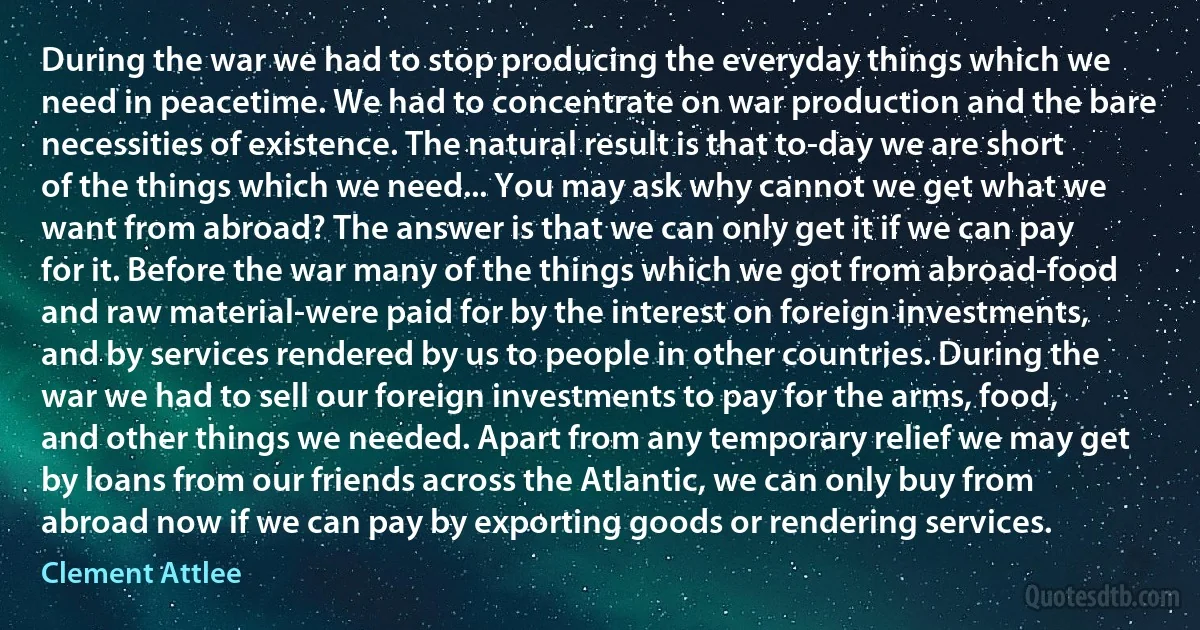
During the war we had to stop producing the everyday things which we need in peacetime. We had to concentrate on war production and the bare necessities of existence. The natural result is that to-day we are short of the things which we need... You may ask why cannot we get what we want from abroad? The answer is that we can only get it if we can pay for it. Before the war many of the things which we got from abroad-food and raw material-were paid for by the interest on foreign investments, and by services rendered by us to people in other countries. During the war we had to sell our foreign investments to pay for the arms, food, and other things we needed. Apart from any temporary relief we may get by loans from our friends across the Atlantic, we can only buy from abroad now if we can pay by exporting goods or rendering services.
Clement AttleeRelated topics
abroad across answer apart arms ask atlantic bare buy concentrate exporting food foreign goods interest natural need now pay people production rendering result sell short stop to-day war friends thingsRelated quotes
Comets are flying around the solar system. As they near the sun, they develop a tail as material is blown off by the solar wind. Most astronomers agree that comets cannot be more than 10,000 years old. They would have completely disappeared by now. Some scientists have recognized this as a serious problem for the theory that the earth is billions of years old, so they have proposed a new theory that new comets are constantly being introduced into the solar system to replace the old ones that burn out. They say they are coming from the "Oort Cloud.” No one has ever seen this Oort cloud, Oort never saw the Oort cloud! There is NO scientific evidence for its existence, but in their mind, this answers the serious problem the short lives of comets creates. There is a simpler answer, of course: the universe is NOT billions of years old!

Kent Hovind
Some people, myself included, advocated foreign intervention in Bosnia and Kosovo while opposing our adventure in Iraq. Sam Moyn might find this inconsistent, but (on this occasion at least) it is the world that is inconsistent, not us. During the Balkan wars individuals' rights were under ascertainable threat in real time. Outside intervention could make a difference, and it did. This was not the case in Iraq. We should always be suspicious of the invocation of universal "rights” as a cover for sectional interests. But it doesn't follow from this that talk of rights is "really” always about something else. Sometimes it is, and sometimes it isn't. How, then, should we adjust our response? Well, there is a serviceable Keynesian answer to that: "When the facts change, I change my mind. What do you do?”.

Tony Judt
If you were part of a group there was always the chance that the predator would take the next guy, not you. It was a cold-blooded lottery that paid off often enough to be worthwhile adapting for.
But there were disadvantages to group living: mainly, if there were large numbers of you, there was increased competition for food. As that competition resolved itself, the inevitable result was social complexity-and the size of the adapids' brains had increased so that they were capable of handling that complexity. Then, of course, they were forced to become even more efficient at searching for food to fuel those big brains.
It was the way of the future. As primate societies became ever more complex, a kind of cognitive arms race would continue, increasing smartness fueled by increasing social complications.

Stephen Baxter
The economic betterment of a nation which is at a low level of intelligence and culture, or in which the population is small in relation to the extent and productivity of its territory, is best accomplished through free trade with highly cultivated, rich, and industrious nations. In the case of such a country every restriction of trade, intended to plant manufacturing industry within its borders, is premature and injurious, not only to the welfare of mankind in general, but to the progress of the nation itself. Only when the intellectual, political, and economic education of the nation has so far advanced as a result of free trade that its further progress would be checked and hindered by the import of foreign manufactures and the lack of a sufficient market for its own goods, can protective measures be justified.

Friedrich List
To the existence of banks of discount for cash... there can be no objection, because there can be no danger of abuse, and they are a convenience both to merchants and individuals. I think they should even be encouraged, by allowing them a larger than legal interest on short discounts, and tapering thence, in proportion as the term of discount is lengthened, down to legal interest on those of a year or more. Even banks of deposit, where cash should be lodged, and a paper acknowledgment taken out as its representative, entitled to a return of the cash on demand, would be convenient for remittances, travelling persons, etc. But, liable as its cash would be to be pilfered and robbed, and its paper to be fraudulently re-issued, or issued without deposit, it would require skilful and strict regulation.

Thomas Jefferson
